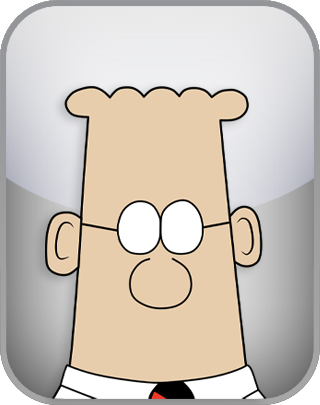Dilbert Diagnosis Test
Which Dilbert Character Reflects Your Psyche?
Clock in and confront the cubicle dystopia. Inspired by the same research spirit that produced the Pooh Pathology Test, this quiz maps your office personality to one of seven iconic Dilbert figures using 35 revealing questions. From anxious perfectionism to passive-aggressive mastery, your answers reveal where you fall on the corporate spectrum. Think you can escape the truth? Think again. Enter your responses below and discover your Dilbert diagnosis—because somewhere between Wally’s naps and Dogbert’s schemes, your real office self is hiding.
Question 1 of 35
Direct confrontation is something I avoid at all costs.
| Disagree | Agree |
NEXT
The Dilbert Diagnosis Test was developed by IDRlabs based on Shea, Gordon, et al.’s research (2000).
Dilbert – Avoidant
Dilbert is the patron saint of competent cowards, trapped forever in cubicle purgatory. He can debug the universe but freezes if three people look at him in a meeting. His little tie flips upward like a surrender flag whenever life gets mildly social. He writes perfect memos that drift unread into the void while the loudest moron gets promoted. Social events are torture, praise is suspicious, and confrontation ranks below “touching a hot stove” on his list of safe activities. He fixes everything silently and hopes the company collapses — preferably on a day when he’s working from home.
Pointy-Haired Boss – Dunning–Kruger
The Pointy-Haired Boss is living evidence that confidence and competence share no DNA. His gravity-defying curls are the only thing rising faster than his bad ideas. He unveils bold initiatives he can’t explain, schedules meetings to discuss future meetings, and truly believes he’s a visionary because no one has bothered to burst his self-regard bubble. Technical details are beneath him; he manages the “big picture,” which exists solely in his head. When projects detonate, he blames execution, never the strategy he sketched on a napkin. In his world, reality isn’t wrong—everyone else is.
Dogbert – Antisocial
Dogbert is a small dog with the ethics of a loan shark and the ambition of a Bond villain. Empathy, guilt, loyalty—he skimmed the definitions once and rejected them as inefficiencies. Whether launching a cult, advising dictators, or selling Dilbert’s soul for consulting fees, he views humanity as one giant, gullible revenue stream. Rules are for prey animals. Remorse is for amateurs. His brutal honesty isn’t kindness; it’s sport. If corporations are legally recognized sociopaths, Dogbert is their totem animal with a tiny green tie and an expense account.
Wally – Passive-Aggressive
Wally is the enlightened monk of doing absolutely nothing while collecting a regular paycheck and the occasional baffling promotion. Effort is for the uninitiated; strategic inertia is the path to workplace nirvana. He has weaponized vagueness, selective hearing, and “I’ll get right on that” into corporate armor. Meetings are meditation sessions. Deadlines are folklore. His sabotage is so subtle it leaves no evidence, only existential fatigue. Wally doesn’t hate the company — he simply transcended earthly concerns like productivity years ago.
Alice – Intermittent Explosive
Alice is the lone competent engineer in an ocean of managerial driftwood, and the strain is turning her into a precision-calibrated volcano. She carries 90% of the workload while watching credit drift toward the decorative employees. Every clueless question, every scope creep, every last-minute “quick fix” adds pressure to the Alice Reactor Core. Normally professional, she can go from calm to cataclysmic in the time it takes someone to say “circle back.” Her legendary “fist of death” has never landed — mostly because HR classified it as an “informal performance motivator.”
Asok – Negativistic
Asok arrived fresh from IIT, glowing with dreams of meritocracy and meaningful work. Corporate reality applied a slow, daily sanding. Now he follows every rule to the letter not out of obedience, but to prove the system is broken. He does twice the work for half the recognition, watches mediocrity ascend the ladder, and files each disappointment like a scientific data point. His optimism has fermented into artisanal bitterness. He shows up early, completes everything flawlessly, and complains as a form of cardio. He’s the ghost of corporate dreams, still haunting the office with perfect work and zero hope.
Catbert – Sadistic
Catbert, the Evil Director of Human Resources, treats HR policy the way a medieval dentist treated patients: with curiosity and zero mercy. Vacation requests? Denied with a purr. Surprise drug tests? His version of a spa day. He writes rules no one can follow just to savor the rising panic, then hides behind “company policy” with a whisker-twitching grin. Open enrollment is his Super Bowl. Exit interviews are dessert. If HR has a final boss, Catbert is waiting at the end with a swivel chair, a laser pointer, and one more denial to click.
References
- American Psychiatric Association. (2013). Diagnostic and Statistical Manual of Mental Disorders (5th ed.). Washington, D.C.
- Shea, S. E., Gordon, K., Hawkins, A., Kawchuk, J., & Smith., D. (2000). Pathology in the Hundred Acre Wood: A Neurodevelopmental Perspective on A.A. Milne. Canadian Medical Association Journal, 163(12), pp. 1557-1559.
- Smith, R.C. (2015): Winnie the Pooh Characters and Psychological Disorders. Ball State University Muncie, Indiana.
Why Use This Test
The Dilbert Diagnosis Test is more than a coffee-break distraction—it’s a window into your inner wage slave or tyrant. Keywords like “Dilbert personality quiz,” “Dilbert character test,” and “corporate syndromes” spark its cult appeal. Are you a Dilbert type, competent but invisible? Or a Pointy-Haired Boss, confidently clueless? Maybe Dogbert’s ruthless edge hits home, or Catbert’s cruelty drives you. This 2025 personality test taps into office culture, delivering a quick, brutal way to spot yourself in the endless meeting room. No TPS reports required—just your answers.

